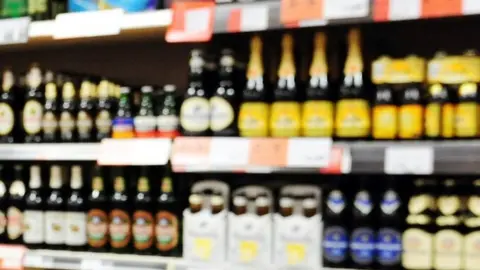Minimum price 'cuts drinking by half a pint a week'
 PA
PAThe introduction of minimum pricing for alcohol in Scotland appears to have cut drinking, a study suggests.
Since May 2018, the price of alcohol has had to be at least 50p per unit.
The study published in the British Medical Journal looked at how much alcohol was bought in shops before and after the move up to the end of 2018.
It found the amount purchased per person per week fell by 1.2 units - the equivalent of just over half a pint of beer or a measure of spirits.
The biggest fall was among the heaviest fifth of drinkers - the amount purchased by this group fell by two units.
But overall Scots were still buying more than 14 units a week, the recommended limit, after the introduction of the new drinking laws.
What is more, the analysis excluded pubs, bars and restaurants, where about a quarter of drinks are purchased.
Impact 'bigger than expected'
Scotland was the first country in the world to introduce a minimum price based on the strength of alcoholic drinks. Research findings have led to calls for the policy to be adopted across the UK.
Wales is looking to introduce minimum pricing in 2020, but neither England nor Northern Ireland currently have plans to set a limit.
Researchers, led by a team at Newcastle University, looked at how much alcohol people were buying in shops and supermarkets, but not in pubs.
They analysed the purchasing habits of 60,000 English and Scottish households between 2015 and 2018. Just over 5,000 of them were in Scotland.
The English households were used as a control group to measure what would have happened if there had not been a minimum price in Scotland.
While households in England increased their consumption slightly, Scottish purchasing fell.
The study said overall it represented a fall of 7.6%, or 1.2 units, a week per adult on what would have been expected.
The team said that was about twice the impact predicted ahead of the move.
 Getty Images
Getty ImagesReductions were most noticeable for beer, spirits, and cider, including own-brand spirits and high-strength white ciders.
But the team acknowledged there needed to be longer-term follow up to see if the drop was sustained, as there was some evidence that in the later months of 2018 consumption had begun to rise again.
Lead researcher Prof Peter Anderson said: "You would expect some levelling off from the initial impact, but I think the findings are enough to suggest minimum pricing is effective and should be adopted across the UK."
Eric Carlin from the Royal College of Physicians of Edinburgh, agreed the evidence was compelling, but he said risky alcohol consumption was a "complex" public health issue.
"No single policy lever should be seen as a panacea," he added.
Scottish public health minister Joe Fitzpatrick said the findings were "very encouraging".